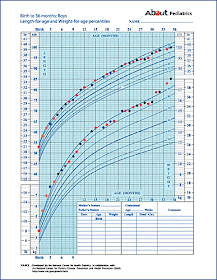
Recently I responded in an online Agenesis Corpus
Callosum (ACC) e-mail support group to the
following question and thought I would share
it here:
Can Agenesis Corpus Callosum Affect Growth?
I am also the mom of a boy, Matthew, who is adopted.
We adopted him at birth and found out he had ACC
when he was four months old. I think every parent
will agree with you that receiving the diagnosis
of ACC for their baby/child is a shock and moving
through all of the overwhelming emotions, questions,
concerns is not an easy task. I cried A LOT during
the first year after my son was diagnosed and went
through tidal waves of emotions...but it did calm
and become easier.
YES, when a child has ACC they may also have
growth problems and it can affect their growth.
Because ACC can affect growth and cause other
various hormone issues, it is very important that
child be seen by a good pediatric endocrinologist
to rule out any problems.

Some children who have ACC require growth
hormones. My own child, Matthew, began seeing
a pediatric endocrinologist when he was younger
because he was very short and nearly below the
growth chart on his height. His weight was fine
but he could wear the same shirts and pants for
two plus years and always looked about two years
younger than the kids in his class. He had various
blood tests to check all of his hormones and he
also had an x-ray of his wrist/hand to check the
bone age. All of his hormones were fine and his x-ray
showed that his bone age was a little over two
years behind his real age. He was (and still is)
followed every year by his pediatric endocrinologist
for a check-up. Also, when a child has ACC they
may not start into puberty or may start puberty
too early or too late. It was explained to me
that because the pituitary sits very close to
where the corpus callosum should be (in the middle
of the brain) that there is the possibility that
the pituitary may also have a problem and may not
function properly. My son started into puberty
without any medical intervention or need for
hormones and is doing fine. He didn't start
puberty until about age 14 years.
ACC is a midline defect and because the corpus
callosum is in the middle of the brain there
is the possibility that the child can have
other midline defects (such as a cleft lip
and/or palate. Another example is the heart
since it is midline in the body. My son had
a heart murmur and because he has ACC he was
seen by a pediatric cardiologist and had tests
to rule out any heart defects/problems.
ACC can also be seen with other medical problems
such as chromosome anomalies, genetic syndromes,
metabolic disorders and optic nerve or eye
conditions.
When a child has ACC they should be seen by a
pediatric ophthalmologist to rule out any optic
nerve problems and/or eye problems. Sometimes
kids who have ACC have a wandering eye (wanders
out or wanders in) (exotropia or esotropia) and
they can prefer to use one eye to focus instead
of using both eyes together. They are at risk
for having amblyopia (permanent loss of sight)
if they continue to use only one eye to focus
because the brain will shut off vision permanently
to the eye that is not being used. It is my
understanding from our own pediatric
ophthalmologist that the risk of amblyopia is
possible until about the age of eight years old
in a child. They are followed VERY closely by a
pediatric opthalmologist to be sure that the
child is using both eyes to focus and to help
the weaker eye become stronger using various
ways...such as patching the stronger eye to force
the weaker eye to be used. Sometimes a child will
require surgery to the eye muscle. My own son did
require eye surgery (on his right eye only) after
patching was not effective.
Below is a link to a list of medical options to
consider and discuss with your child's doctor(s):
http://scenicbeauty.tripod.com/WhatComesNext.html
Please feel free to e-mail me anytime. I am happy to share anything about my own son, Matthew, and our experiences with ACC.Sandie *Mom to 16 year old Matthew with complete ACC*
Disclaimer:
The information found on this web site is written based upon my own personal experiences and comes from what I have learned while dealing with my son's ACC. Please seek the advice of a qualified physician for medical advice.


